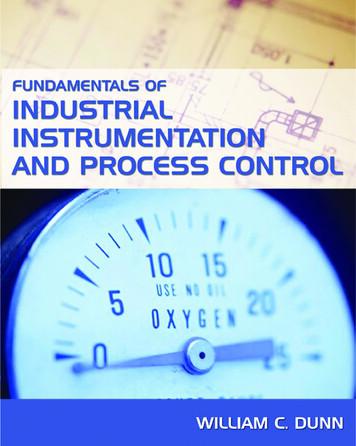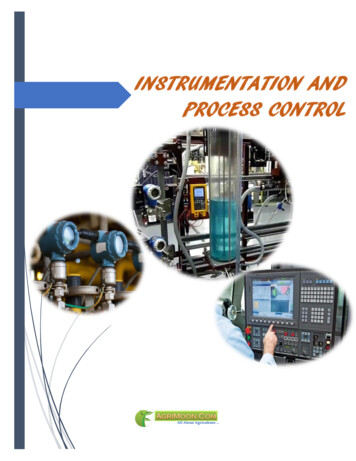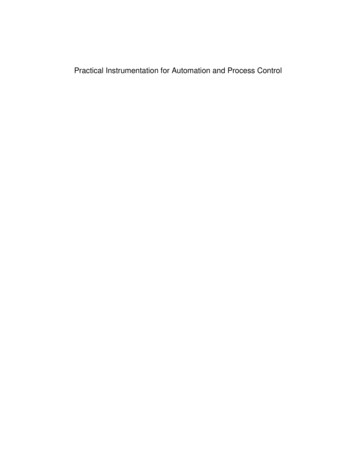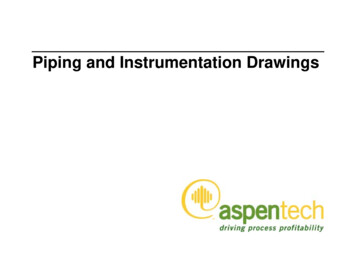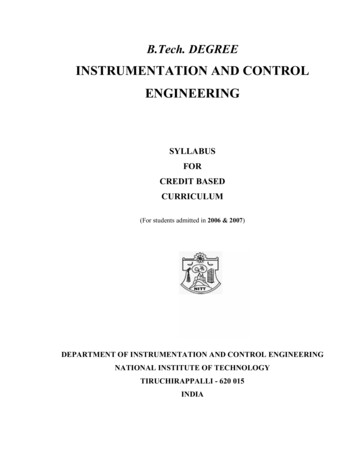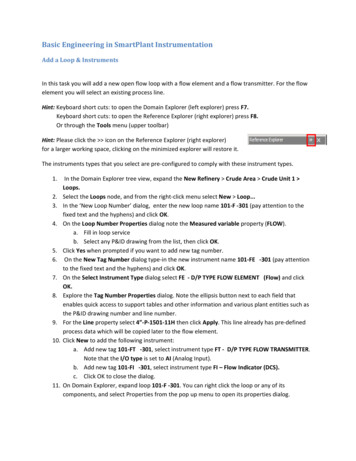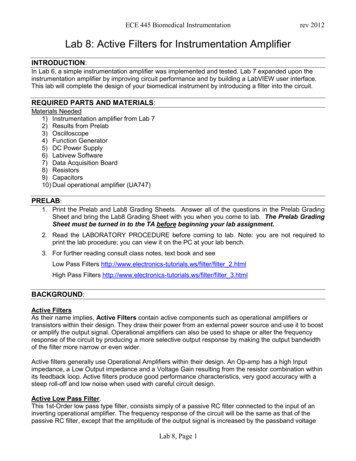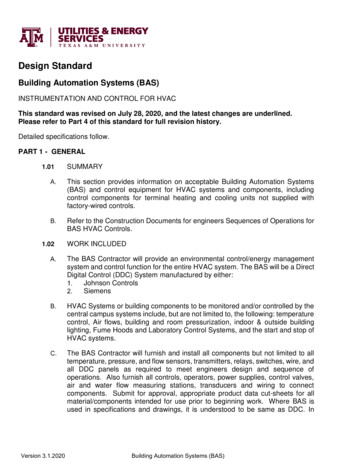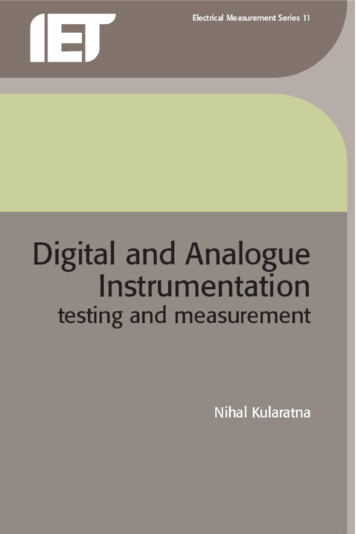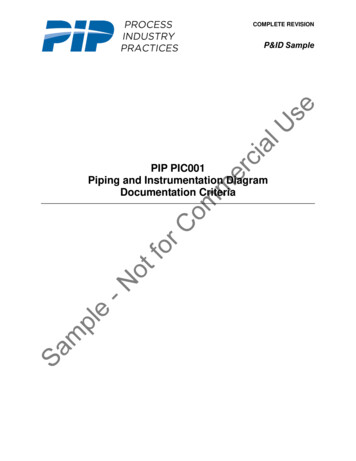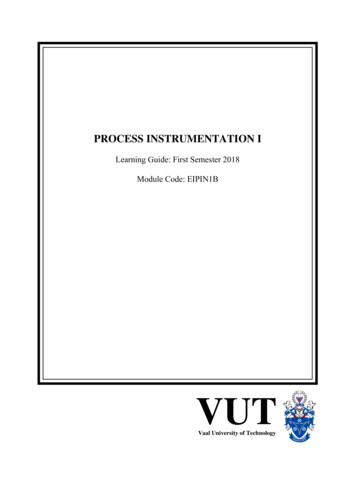
Transcription
PROCESS INSTRUMENTATION ILearning Guide: First Semester 2018Module Code: EIPIN1BVUTVaal University of Technology
Learning Guide - Process Instrumentation IiiINDEXPART I Module Information1.2.3.4.5.6.7.8.9.10.11.Word of welcome . . . Contact persons .Rationale for the module . .Prerequisites Learning material Assessment . .Icons used in this study guide . . . .Action Verbs . Module plan . .Time schedule/learner work program . . Module outcome . . .ivivivivivivviviiixixixPART II Learning UnitsUnit 11. Chapter 1 – Introduction to Industrial Instrumentation . . . .1.1 Measurement Standards . . 1.2 Functional Elements of Instruments . . .1.3 Static characteristics of instruments . 1.4 Instrument errors . . .1.5 Industrial instrumentation schematics . . .2. Chapter 2 –Pressure Measurement . . . . .2.1 Introduction and definitions . . . 2.2 Pressure in a liquid . . .2.3 Pressure measurement with manometers . 2.4 Measuring pressure with elastic structures . .2.5 Measuring pressure with the force-balance gauge .2.6 Measuring pressure with the differential pressure transmitter .2.7 Strain gauges .3. Chapter 3 – Flow Measurement . . . .3.1 Introduction . . . 3.2 Derivation of the flow equation . . .3.3 Differential pressure method of measuring flow . 3.4 Other flow meters . . -33-43-5
Learning Guide - Process Instrumentation IiiiUnit 24. Chapter 4 – Level Measurement . . . . .4.1 Direct methods . . . . 4.2 Indirect methods . . . .5. Chapter 5 – Temperature Measurement . . . .5.1 Introduction . . . 5.2 Expansion and pressure thermometers . . . .5.3 Resistance thermometers . . 5.4 Thermocouple thermometers . . . .5.5 Thermistor thermometers . . . . .6. Chapter 6 – Process Control . . . .6.1 Introduction . . . 6.2 Control schemas . . . .6.3 PID controllers . . . 6.4 Pneumatic control valves . 4-14-24-25-15-25-25-35-45-46-16-26-36-36-4Unit 37. Thermometer Project7.1 Project outcome . . . . 7-17.2 Project schedule . . . . . 7-17.3 Assessment . . . . 7-3Unit 48. Laboratory Assignments8.1 Outcome . . . . . 8.2 Laboratory schedule . . . . .8.3 Assessment . . . . Laboratory guidelines, rules and procedures .Experiment 1 assessment guide .Experiment 2 assessment guide .Experiment 3 assessment guide .Experiment 4 assessment guide .Experiment 5 assessment guide .Experiment 6 assessment guide .Experiment 7 assessment guide .8-18-18-18-38-68-78-88-98-108-118-12
Learning Guide - Process Instrumentation Iiv1. WORD OF WELCOMEThe Department of Process Control and Computer Systems, welcomes you as astudent to the Faculty of Engineering at the Vaal University of Technology. Thedepartment strives towards integration of existing knowledge with new knowledge andto afford the student the ability to think logically, gain knowledge of ElectricalEngineering, and specifically Process Instrumentation, in order to make a positivecontribution to the field of Industrial Instrumentation and Electrical Engineering.2. CONTACT PERSONSNameProf MO Ohanga (HOD)Ms. R Mwale (Administrator)Mr. TV Maloka (Lecturer)Mr. B Nel (Lecturer)Ms Z van Tonder (Lab Technician)OfficeR007R007S113S115J003Telephone no & e-mail address016 950 9323 marcelo@vut.ac.za016 950 9254 refilwem1@vut.ac.za016 950 9433 malokat@vut.ac.za016 950 9435 bennien@vut.ac.za016 950 9432 zeldavt@vut.ac.za3. RATIONALE FOR THE MODULEOn completion of this module you should be knowledgeable in the operation ofpressure, flow, level and temperature measuring instruments and competent in theimplementation, calibration and maintenance of industrial instruments in an industrialcontrol environment. This module relates closely to all the other modules in theElectrical Engineering Programme since it ought to improve your ability to understandthe learning content and formulate your assignments and examination answers.4. PREREQUISITESNo previous exposure to instrumentation technology is assumed. Students are howeverexpected to be competent computer and internet users for the purpose of research andto obtain additional learning material. Students are also expected to have receivedexcellent results in Mathematics and Science for grade 12 and therefore in possessionof solid basic mathematical skills.5. LEARNING MATERIALThis learning guide as well as the course material and previous evaluations, will bemade available to students at the beginning of the semester.6. ASSESSMENTModule assessment will take place on a continuous basis, and for this purpose themodule is divided into four units. Unit 1: Chapters 1 to 3 (weight 35%) Unit 2: Chapters 4 to 6 (weight 35%) Unit 3: Project (weight 10%) Unit 4: Laboratory assignments (weight 20%)
Learning Guide - Process Instrumentation Ivi) Module assessment: To successfully complete each unit, students must receive aunit mark of at least 50%. To successfully complete the module, students mustcomplete all the units. A student that successfully completes the module willreceive a module mark according to the following summative assessment schedule:Module% 0.35 Unit1% 0.35 unit2% 0.1 unit3% 0.2 unit4%.The continuous assessment programme does not allow for supplementary orrewritten examinations. Students that fail to complete this module, must resumetheir studies by completing all units again during a subsequent semester.ii) Unit 1 assessment (1½ hour session): Assessment of unit 1 is scheduled forFriday 9 March 2018 at 14h00. Students that fail to receive 50% for unit 1,will be offered a second and final opportunity to complete unit 1 on Friday20 April 2018 at 14h00. Students who successfully complete the finalassessment, will however receive a maximum mark of 50% for unit 1. Studentswho were unable to attend the first assessment session, will receive the full markobtained for the final assessment of unit 1. The assessment venues (main campus)that may be available are G302, G305, G306, T104 and T203, while assessmentvenues will be arranged for the satellite campuses. A student that fails to receive50% for the final attempt to complete unit 1, fails the module.iii) Unit 2 assessment (1½ hour session): Assessment of unit 2 will take place onFriday 13 April 2018 at 14h00. Students that fail to obtain 50% for unit 2,will be offered a second and final opportunity to complete unit 2 on Friday11 May 2018 at 14h00. Students who successfully complete the finalassessment, will however receive a maximum mark of 50% for unit 2. Studentswho were unable to attend the first assessment session, will receive the full markobtained for the final assessment of unit 2. The assessment venues (main campus)that may be available are G302, G305, G306, T104 and T203 while assessmentvenues will be arranged for the satellite campuses. A student that fails to receive50% for the final attempt to complete unit 2, fails the module.iv) Unit 3 assessment: For the purpose of assessing unit 3 (project), each studentwill demonstrate the operation of a thermometer, constructed according to theguidelines given in the learner guide for unit 3. Unit 3 will be assessed in thelecture room, on the date and time scheduled by the lecturer. A clear photograph(as well as a copy of the photograph) showing the project with the student’s studentcard (or other clear identification), must also be available when the project isassessed. Students that fail to receive 50% for unit 3, will be presented with asecond and final opportunity to complete unit 3, on the date and time scheduled bythe lecturer. Students that successfully complete unit 3 with the final assessment,will however receive a maximum mark of 50% for unit 3. A student that fails toreceive 50% for the final attempt to complete unit 3, fails the module.
Learning Guide - Process Instrumentation Iviv) Unit 4 assessment: Unit 4 will be assessed on a continuous basis during thesemester. Students will receive the assessment dates and times for their laboratoryassignments, at the beginning of the semester after lecturing has started. Theassessment venue is room J003 on the main campus. Assessment venues and dateswill be scheduled for satellite campuses. A student that is unsuccessful in obtaining50% for unit 4, will not be presented with a second opportunity to complete unit 4and fails the module.vi) Module portfolio: The module portfolio is a collection of all the assessmentmaterial produced by a student for unit 3 and unit 4 during the semester, neatly puttogether in a folder. Any relevant medical certificates, death certificates or otherofficial documents supporting the reasons for not attending an assessment session,should be included in the portfolio. Students should not include their physicalproject (unit 3) in the portfolio but rather a copy of the project photograph thatformed part of their project demonstration.Eachstudentmustpurchase a plastic folder ofexactly the type shownhere to the right. Thechoice of colour is left toeach student’s personaltaste, except that the foldermust be transparent so thatthe header page will bevisible inside the folder.The header page must belabelled with the module name (Process Instrumentation I EIPIN1), year, semesterand group (period A to H), as well as the name of the student and student number.Students should hand in the folder with their first laboratory assignment. Studentswill have the opportunity during the first practical period after the practicalprogramme has ended, to prepare their module portfolio and verify that allrelevant material is included before it is collected for assessment, moderation andcalculation of the final mark for unit 4.7. ICONS USED IN THIS STUDY GUIDE123456Estimatedstudy timeOpeningremarks andintroductionOutcomesStudy tionsandassessment
Learning Guide - Process Instrumentation Ivii8. ACTION VERBSIn preparation for your studies in this module the action verbs used in the assessmentof your work in this module are given to you in advance. Make sure that youunderstand the meaning of each and that you deliver your work accordingly. Define To supply the accurate meaning of a concept. [Example: Define pressure.] Name/mention/list/state/write down/give Briefly provide required informationwithout giving details. Neither a discussion nor an explanation is necessary.[Example: Give the temperature of the oxygen point on the international temperature scale or State two direct methods of measuring the level in a container.] Outline Emphasise the major features or general principles of a topic. Slightlymore detail than in the case of naming, listing or stating of information is required.[Example: Outline the essential features of the Celsius temperature scale.] Comment Briefly stating your own opinion on a subject. [Example: Comment onthe relevance of instrumentation in process control.] Indicate Point out, make known, state briefly. [Example: Indicate the advantageof using an annubar flow meter over a pitot tube flow meter.] Identify Give the essential characteristics or aspects of a phenomenon. [Example:Identify the forms of energy, involved in a liquid in motion.] Demonstrate Include and discuss examples. You have to prove that youunderstand how a process works or how a concept is applied in real-life situations.[Example: Demonstrate how Archimedes’s principle is applied when measuringlevel with the torque tube level indicator.] Describe Say exactly what something is like, give an account of the characteristicsor nature of something, explain how something works. No opinion or argument isneeded. [Example: Describe the operation of a pneumatic differential pressuretransmitter.] Discuss Comment on something in your own words. Often requires debating twoviewpoints or two different possibilities. [Example: Discuss the relativeadvantages and disadvantages of using a venturi tube or an orifice plate, tomeasure flow rate.] Example A practical illustration of a concept is required. [Example: Give anexample of a linear movement valve.] Explain/clarify Clarify or give reasons for something, usually in your own words.You must prove that you understand the contents. It may be useful to useexamples or illustrations. [Example: Briefly explain the term hysteresis.] Illustrate Draw a diagram or sketch the representation of a phenomenon or idea.[Example: Illustrate with a sketch how a u-tube manometer can be used tomeasure differential pressure.] Motivate You should give an explanation of the reasons for your statements orviews. You should try to convince the reader of your view. [Example: Motivatethe control strategy that you will use for a lecture room temperature controller.]
Learning Guide - Process Instrumentation I viiiSummarise Give a structured overview of the key (most important) aspects of atopic. This must always be done in your own words. [Example: Give a summary ofthe measurement errors that may occur while using an instrument.]Analyse Identify parts or elements
Learning Guide - Process Instrumentation I iv 1. WORD OF WELCOME The Department of Process Control and Computer Systems, welcomes you as a student to the Faculty of Engineering at the Vaal University of Technology. The department strives towards integration of

